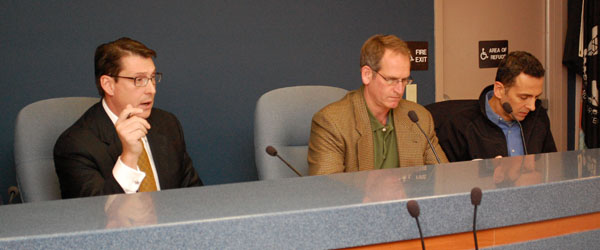Mayor questions legality of Loch Arbour clerk’s severance deal
Meeting minutes, recording don't match up
The estimated $750,000 severance package for former Loch Arbour village clerk Lorraine Carafa may have been approved under unlawful circumstances due to a discrepancy between the minutes and a recording from the meeting when the deal was approved.
The resolution establishing an agreement between Carafa and the village was discussed in closed executive session on Nov. 2, 2011, and the village’s board of trustees unanimously approved it afterward. But the meeting’s minutes and the corresponding recording don’t match up, and the apparent procedural errors may constitute a violation of the Open Public Meetings Act [OPMA].
Mayor Paul Fernicola [pictured above, left] brought this to the attention of the commissioners and the public at last night’s commissioners meeting.
Before discussing an issue in closed executive session, a governing body must announce that they are meeting behind closed doors, as well as identify what they will discuss — in this case, personnel matters — according to OPMA. OPMA also requires governing bodies to disclose whether or not they expect to take action upon their return from executive session, Fernicola said.
Fernicola was present at the Nov. 2, 2011, meeting, he said. He did not recall anyone on the dais stating the reason for the executive session, or stating whether the commission would reconvene afterward.
Fernicola looked back at the minutes from that meeting. According to those minutes, the proper OPMA procedure was followed, with a resolution establishing the closed session being approved, and with board president John Zazzarino indicating that the board may take action upon its return.
But a recording of the meeting indicates that before the executive session, the only statement made was a motion to adjourn to caucus.
“There is no legal type of meeting called a caucus,” Fernicola said. “What was done and what’s reflected in the minutes are two entirely different things.”
The recording also shows that after returning from executive session, the commissioners intended to adjourn the meeting until Zazzarino said, “No, hold on, can we do this resolution right now?”
The commissioners discussed the terms of the agreement, including post-employment health benefits for both Carafa and her husband.
Also, the minutes show a resolution to go into executive session and a resolution to approve the execution of the agreement. This is not consistent with the resolutions that were signed afterward, village attorney Guy Ryan said. There is no record in the resolution books of the resolution to go into executive session, he said.
The minutes and resolutions are all signed by Carafa, who was tasked with preparing the minutes of each meeting during her employment with the village, which ended Dec. 31, 2012. Carafa also prepared the resolution dictating the terms of her contract.
Although the resolution establishing the agreement between Carafa and the village was approved on Nov. 2, 2011, the village attorney did not review it until Nov. 30, 2011, and it was signed in early December 2011, Fernicola said.
“It wasn’t even drafted on Nov. 2 when it was approved,” Ryan said. “According to the DCA [Department of Community Affairs], it appears the resolution wasn’t even drafted until seven days after.”
Fernicola played the recording of pertinent portions of the meeting for the crowd at last night’s commissioners meeting. He also distributed transcripts of the recording.
The Nov. 2, 2011, meeting took place just before Nov. 8 elections and the audience was full, he said.
“This room was standing-room only,” he said. “You didn’t even have enough seats for people. And not a single person stayed [for executive session].”
Also, there are no minutes from the executive session that night, Fernicola said, although OPMA requires that minutes be taken for all closed session meetings, to be made public when confidentiality is no longer needed.
Paul Williams, a village resident who was on the board of trustees at the time the contract with Carafa was approved, asked why the commissioners couldn’t just rescind the resolution.
“The trustees did not just adopt a resolution,” Fernicola replied. “You also entered into a contract [with Carafa].”
The contract cannot be rescinded without mutual agreement, Ryan added.
Another village resident asked if the agreement would be nullified when Carafa and her husband reach 65 and are eligible for Medicare.
“There is no cap and no limitation that you’d typically see when someone reaches Medicare eligibility,” Fernicola said. “That’s not what the contract the trustees signed provides for.”
Also, the resolution and contract state that Carafa and her husband will receive health benefits, not insurance. This could mean the village is required to pay more than just insurance, possibly including copays and other health costs, Fernicola said.
“This is the dilemma we have because we had the employee draft her own contract,” he said.
The demand in the contract is that Carafa and her husband start receiving benefits as of Feb. 1, 2013, as she was not on the village’s health care plan for the past 10 years.
Carafa’s deal with the village entitles her and her spouse to “post-employment health benefits,” according to the resolution, as well as compensation for a maximum of 75 unused vacation days; compensation for a maximum of 75 unused sick leave days; and two paid personal days per calendar year after retirement or resignation. Carafa estimated the package to be worth $750,000 in a letter.
The resolution also specifies that in the event of a merger or consolidation between Loch Arbour and another municipality, Carafa is entitled to two weeks of salary at the then-current compensation rate for each year of service to the village, in addition to any other payments for unused vacation or sick leave.
A FORMER TRUSTEE RESPONDS
Paul Williams, the former trustee who was on the board when the resolution was approved, said the board’s goal in inking the deal with Carafa was simply to protect a long-term village employee. In the event of a merger, it is unlikely another borough would have re-hired Carafa, Williams said.
“The intentions we had were above-board for the five of us,” he said. “But unfortunately, the way it came out was not what we had intended when we walked into caucus. The lifetime [health benefits] and including her husband — that was never discussed.”
Williams also did not realize Carafa would be drafting the resolution herself, he said.
“We wanted to protect Lorraine because we knew she wasn’t going to be hired by Allenhurst. She was a great asset to Loch Arbour. She went out of her way to make sure people were taken care of,” he said.
As for whether OPMA was violated at the November 2011 meeting, Williams said the informal tone was a result of Loch Arbour being a small town.
“You have to understand Loch Arbour is a village of 180 people,” he said. “Everybody gets along with everybody else. Nobody was trying to do anything incorrectly. We just wanted to protect Lorraine.”
OTHER CONSOLIDATION NEWS
Fernicola has sent a letter to the Ocean Township board of education [BOE] requesting a meeting with them to discuss the possible merger. Fernicola has also made a request with the Deal Police Department to meet with them, as that borough currently polices Loch Arbour under a shared service agreement.
The mayor also has set up a conference call between himself, Allenhurst Mayor David McLaughlin and a representative of the state Department of Education to discuss the potential merger’s affects on school systems. That call is scheduled for Jan. 7.












